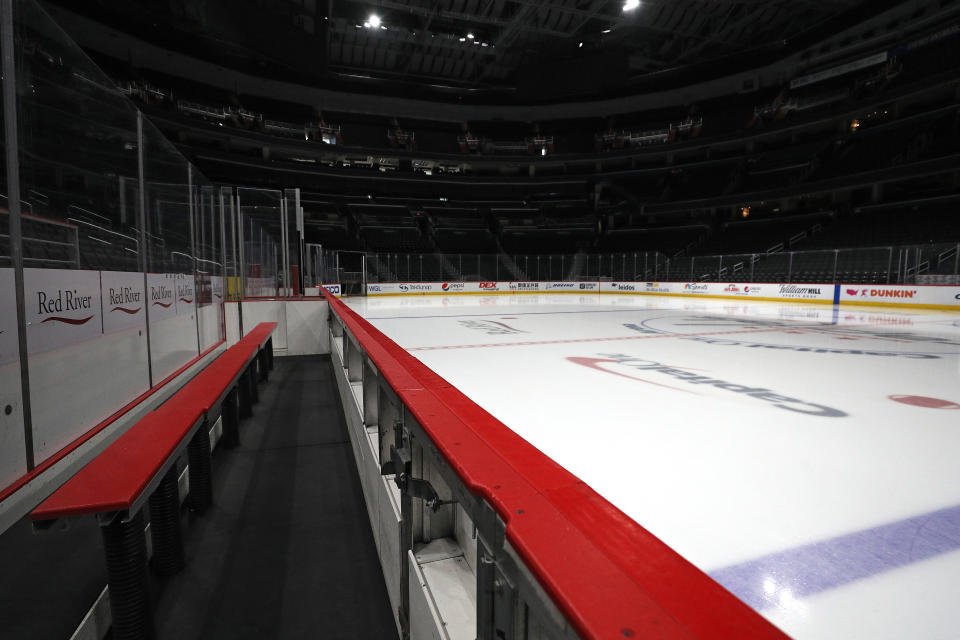How the NHL handled COVID-19, and the uncertainty that lies ahead
With sports, it seems it could have only gone one of two ways. It would either represent the most powerful factor to alerting the masses to the seriousness of a true global health pandemic, or it would serve as a highly dangerous vehicle rapidly spreading the COVID-19 virus to many more thousands, including those seriously vulnerable to the effects.
Thankfully, just moments after a medical official sprinted out onto the hardwood in Oklahoma City to recommend that Wednesday’s game between the Jazz and Thunder should not be played because a player had tested positive for the viral condition, arguably the most influential and forward-thinking league in global sports shut down operations immediately, doing its part to decelerate the seemingly inevitable spread of the infection.
In the 12-36 hours that followed, and once all the difficult discussions with sponsors, agencies and ownership groups took place, virtually every other respectable sports association took the same precaution, including the NHL.
"I decided it was time to get ahead of it and not wait for one of our players to get tested, because in all likelihood, at some point in time, we weren't going to get through the rest of the season without a player testing positive," Gary Bettman said a few days later in an interview with CNBC, via NHL.com.

It might have taken the NHL a little longer than some expected or hoped to make the decision to “pause” the season, but it’s hard to quibble with how the league handled the response. Without a confirmed case, and with all players and staff advised to stay home the following morning and therefore not at risk of exposure, Bettman and the NHL had every reason to brief the board before going public with the decision to suspend activities.
For the most part, official statements from leagues across the world read largely the same—with the exception of some key operative words. While the IIHF World Championships, NCAA March Madness, XFL season and select PGA Tour events among others were permanently canceled, the NHL, like many other leagues, put its season on hold temporarily, stating an intention to restart once health officials are able to gain a clearer view of the COVID-19 virus, and develop the means to controlling it.
Experts believe that a few weeks or even the month-long timetable that the NBA initially outlined is beyond optimistic, and that the road back to some semblance of societal normalcy will take far longer than that. It would be irresponsible of the part of any sports league to push through before the virus is contained. Because until it is, everyone remains at risk.
That means in all likelihood, the NHL will have to punt operations further down the road than initially envisioned, which means that ending the season the same way it has for the last 100 non-lockout years, which is by distributing the Stanley Cup, carries with it far more complication.
How to move forward?
Bettman told Sportsnet’s Hockey Central on Friday that amid the coronavirus outbreak the NHL is busy exploring every possible contingency plan leading up to a potential return-to-play date. The mechanism to achieve that, he says, has been to identify the last possible date to stage competition for the season, and model and develop different scenarios while working back from that drop-dead date.
However, with a team like the Carolina Hurricanes playing literally every other day and twice on weekends throughout the month of March, it’s obvious that in order for the league to accomplish its goal, serious concessions will have to be made.
The first of which is this: the NHL will relinquish the ability to deliver on its promise of an equal and equitable opportunity when determining which teams advance to compete in the Stanley Cup Playoffs.
As of the moment the league officially pressed pause, the last-place Detroit Red Wings were the only team that had established their fate one way or another. While elimination would be merely a formality for another bunch of teams, more than two thirds of the league’s teams were legitimately in the throes of the postseason chase and jockeying for meaningful position in the standings. In particular, there are currently nine teams within three points of each other when looking at both wild card chases, and only four of those teams will qualify under the current format.
Because there is virtually no chance that the NHL will be able to play out the string on its regular season, a change will have to be made to establish seeding. Barring something incredibly creative, that means a significant percentage of teams will unfairly lose out on a chance at playoff revenue and a chance to win a Stanley Cup, assuming the postseason happens at all.
A Cup that comes cheaper?
There’s also the idea—or maybe the concern—of preserving and maintaining the sanctity of the Stanley Cup Playoffs themselves.
By its most recent definition, teams and players must survive four teams in a best-of-seven format and a gruelling two-month slog of competition in order to call themselves Stanley Cup champions. They must be (at least in a figurative sense) battered, bruised and bearded to truly earn an inscription on the trophy itself.
Without that process, or at least competition that could compare, the NHL would risk this otherwise incredible accomplishment feeling somewhat cheap.
That isn’t to say that fun alternatives won’t be discussed. For example, an all-encompassing true single-elimination knockout tournament that would mirror the NCAA’s basketball championships would unbelievably exciting while establishing a reasonably fair playing field, and could obviously be completed in a far shorter timespan as well.
If only this one time, a change to the format with the Stanley Cup Playoffs makes sense.
But the NHL might have to decide, among its many decisions, if it’s willing to make, or pretend, that a Stanley Cup won in a different way could be seen equal as all the previous championships won.
More NHL coverage on Yahoo Sports

 Yahoo Sports
Yahoo Sports 


